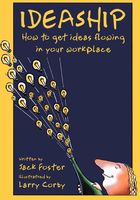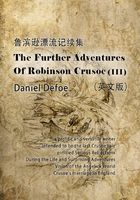When my childhood had slipped by, and the days no longer seemed eternal but had shrunk to twelve hours or less, I began to think seriously about death. It was my grandmother's funeral procession, in which half the women of Drepanum marched, lamenting like curlews, that made me conscious of my own mortality. Soon I should marry, bear children, grow stout, old and ugly—or thin, old and ugly—and presently die. Leaving what behind? Nothing. Expecting what? Worse than nothing: everlasting half darkness, where the ghosts of my ancestors and ancestresses wander about an unfeatured plain, gibbering like bats; skilled in all the lore of past and future, yet forbidden to profit from it; still endowed with such human passions as jealousy, lust, hatred and greed, but powerless to consummate them. How long is a day when one is dead?
A few nights later my grandmother appeared to me in a vision. Three times I sprang towards her and tried to hug her, but each time she stepped aside. I was deeply hurt and asked: "Grandmother, why will you not stay still when I try to kiss you?"
"Darling," she answered, "all mortals are like this when they are dead. Sinews no longer constrain their flesh and bones, which perish in the cruel flame of the pyre; and the soul flits away like a dream. Do not think I love you less; but I have no substance."
Our priests assure us that certain heroes and heroines, children of the Gods, enjoy an enviable immortality in the Islands of the Blessed; a fancy which the tellers themselves do not believe. Of this I am certain: that no true life exists beyond the life we know, namely the life beneath the sun, moon and stars. The dead are dead, even though we pour libations of blood for their ghosts to drink, hoping to give them an illusion of temporary rebirth. And yet—
And yet there are the songs of Homer. Homer died two hundred years ago, or more, and we still speak of him as though he were living. We say that Homer records, not that he recorded, such and such an event. He lives far more truly even than do Agamemnon and Achilles, Ajax and Cassandra, Helen and Clytaemnestra, and the others of whom he wrote in his epic of the Trojan War. They are mere shadows, given substance by his songs; which alone retain the force of life, the power to soothe or stir or draw tears. Homer is now, and will be when all my contemporaries are dead and forgotten: I have even heard it prophesied, impiously, that he will outlast Father Zeus himself, though not the Fates.
Brooding on these things at the age of fifteen, I grew melancholy and reproached the Gods for not making me immortal; and envied Homer. This was odd, certainly, in a girl, and our housekeeper Eurycleia often shook her head at me when I mooned about the Palace with a set, downcast face, instead of enjoying myself like others of my age. I never answered her, but thought: "And you, dear Eurycleia, have nothing left in store for you but ten or twenty years at the most, during which your strength will gradually decline and your rheumatic pains increase, and then what? How long is a day when you are dead?"
This preoccupation of mine with death excuses, or at least explains, the most unusual decision I have recently taken: of securing for myself a posthumous life under the mantle of Homer. May the Blessed Gods, who see all, and whom I never neglected to honour, grant me success in this endeavour, and conceal the fraud. Phemius the bard has sworn an unbreakable oath to put my epic poem in circulation: thus paying the debt he incurred on that bloody afternoon when, at the risk of my own life, I saved him from the two-edged sword.
As for my condition and lineage: I am a princess of the Elymans, a mixed race living on and about Eryx, the great, bee-haunted mountain which dominates the westernmost corner of three-sided Sicily and takes its name from the heather upon which countless bees pasture. We Elymans pride ourselves on being the remotest nation of the civilized world; though this is, indeed, to disregard certain flourishing Greek colonies planted in Spain, and Mauretania since we first made the boast—not to mention the Phoenicians, who, though non-Greek and addicted to barbarous human sacrifice, have some claim to be called civilized, and are established at Carthage, Utica and elsewhere on the African coast. I must now give a brief account of our origins. My father claims direct male descent from the hero Aegestus. Aegestus was born in Sicily, a son of the River God Crimissus and the exiled Trojan noblewoman Aegesta, but is said to have sailed to Troy at King Priam's request when King Agamemnon of Mycenae besieged the city. Troy, however, was fated to fall, and Aegestus had been fortunate to escape death among the Achaean spears. Roused from sleep by his kinsman Aeneas the Dardanian, as soon as the enemy, breaking into Troy, began to massacre the drowsy inhabitants, he led a party of Trojans out through the Scaean Gate and away to Abydus; Abydus being a fortress on the Hellespont where (so they say), mindful of a prophetic warning given by his mother, he kept three well-provisioned ships moored in readiness. Aeneas also escaped. Cutting his way through the Achaean forces to Mount Ida, he made preparations there for embarking his Dardanian subjects in a fleet beached at Percote, and presently followed in Aegestus's wake.
A fresh gale carried Aegestus south-westward across the Aegean Sea, past Cythera, Aphrodite's island; and westward across the Sicanian Sea, until he sighted Etna, the ever-burning mountain, which rises on the opposite side of Sicily from us. Here he landed and drew water for his fleet before steering south to round Cape Pelorus. Five days later, the Aegadean Islands rose into view, and he thankfully beached his ships in the landlocked bay of Rheithrum, under the shadow of Mount Eryx, where he had been born. A blue halcyon bird skimmed past the ships' sterns, and at this sign of favour from the Goddess Thetis, who calms the sea, Aegestus burned them in her honour; but first he prudently unloaded all the cargo, cordage, sails, metal, and other objects which might be of use to him ashore. It was to commemorate this sacrifice, offered some four hundred years ago, that my parents named me Nausicaa, which means "Burning of Ships".
No other Greek-speaking colonists had as yet settled in Western Sicily. The entire island, except for a few Cretan colonies, was then inhabited by Sicans, an Iberian race, many of whom had befriended Aegestus and his mother in their strong city of Eryx, which nestles on the mountain's knees. Aegestus approached their King, his foster-father, with noble gifts of cauldrons, tripods, and bronze weapons fetched from Troy, interceding for the Trojan refugees; and though, being a naturally morose and self-sufficient race, the Sicans of Eryx did not disguise their suspicions, the King at last persuaded his council to let Aegestus build himself a city nearly at the top of the mountain. Aegestus named it Hypereia, or "Upper Town"; and bought from the Sicans a large stock of sheep, goats, cattle and hogs. Soon Aeneas arrived with six more ships, on his way to Latium, and proved his friendship by helping Aegestus to complete the city walls. He also founded the Temple of Aphrodite on the summit—an erotic institution in favour of which I have little to say; though Aeneas's act was a pious one, Aphrodite being his mother. At first the people of Hypereia lived on neighbourly terms with those of Eryx, who showed them all the riches of the mountain and, in return, were taught the finer mysteries of smithcraft and carpentry, besides the art of harpooning tunny and swordfish from a platform set halfway up the ship's mast. The two nations being united in their devotion to the Sican Mountain Goddess Elyme—whom our people identified with Aphrodite, though she bore a far closer resemblance to the Goddess Alphito of Arcadia—we are now known as Elymans.
Some seven generations later, another element, the Phocaean, was added to the Elyman nation thus formed; and by then the proud Achaean cities of the Peloponnese, in which the destruction of Troy had been planned, lay ruined. Barbarous Dorians, the so-called Sons of Hercules, wielding iron weapons, and with iron hearts, had swept through the Isthmus of Corinth, burned citadel after citadel, and driven the Achaeans from their rich pastures and cornfields into the mountainous regions of the North; there they still survive, dwindled and inglorious. The elder inhabitants of Greece, however—Pelasgians, Ionians and Aeolians—as many as loved liberty and possessed ships, hastily gathered together their treasures and set sail to find new homes overseas, especially on the coast of Asia Minor, where they had often before gone trading. Among these emigrants were Phocians from Mount Parnassus, descendants of Philoctetes the archer, whose arrows accounted for Prince Paris at Troy; but two Athenian noblemen led them. Their new city of Phocaea, built on the mainland behind Chios, became famous for its fifty-oared merchant-galleys which ventured across the length and breadth of the Mediterranean: as far westward as the Pillars of Hercules, and as far northward as the mouth of the Po. Geryon, King of Tartessus in Southern Spain, having taken a liking to certain honest Phocaean traders, invited these to settle in his country, and promised to build them a city. They agreed with joy, and sailed home to fetch their wives, children, household goods and sacred images; expecting to find the city walls already raised to receive them when they landed in the following summer.
Yet the Blessed Gods disposed otherwise. The colonists sailing in convoy, their prows wreathed in myrtle, were blown off course by a north-easterly gale and cast ashore among the lotus-eating Nasamonians of Libya. Though they saved five of their seven ships, these proved so unseaworthy that, taking advantage of a brisk south wind, they steered for Sicily, the nearest land where it would be possible to refit. Mount Eryx was reached in safety, with every hold deep in water, and they beached the flotilla at Rheithrum, not having lost a man, though their provisions were spoilt. Believing that the God Poseidon had designed them to settle hereabouts rather than in Tartessus—the myrtle on their prows forbade their return—they came as suppliants to the King of Hypereia, who magnanimously forgave them the wrongs which their ancestors had done to the Trojans. It is said, nevertheless, that the captain and crew of one ship attempted to sail back to Asia Minor, but they had gone no farther than a mile and a half before Poseidon transformed the ship into a rock; and there she still rides for all the world to see. They call her the "Rock of Evil Counsel", and also add that Poseidon threatened to topple down the summit of Eryx on the heads of any other would-be deserters.
Now, the Hypereians had built a hamlet on the northern foothills of Eryx and named it Aegesta, after their ancestress; as they also named its two streams Simo?s and Scamander, after the Trojan rivers mentioned by Homer. Here, with the permission of the King of Eryx, they had set up a hero shrine for the ghost of Anchises the Dardanian, Aeneas's father, who was said to have died during the building of Hypereia. The Phocaeans using Sican labour and adopting the Sican style, soon enlarged this village to a city, over which a prince of Hypereia was appointed to rule. But the wild Sicans, resentful of this new encroachment on their grazing and hunting grounds, did not hesitate to ambush and kill the newcomers; and Eurymedon, the Sican King of Eryx, refused to intervene, declaring that he had never consented to the Phocaean occupation of Aegesta. He even lent his compatriots secret help; and this naturally precipitated a quarrel between the cities of Eryx and Hypereia. Armed clashes led to a full-scale war, in which Eurymedon was soundly defeated. The Hypereians seized Eryx, proclaiming their own King "Father of the Elyman League"—Eryx, Hypereia, and Aegesta—and ordered the city councils to foster intermarriage between the three races. Our blood is therefore mixed, yet our ruling tongue is Ionian Greek, touched a little with Aeolian; and though remotely placed, we are far better people in every way than the Dorians of the Peloponnese, who camp sluttishly among the blackened ruins of the beautiful cities celebrated in Homer's songs.
This land of ours is good and its seas full of fish—especially tunny, the firm flesh of which has always been our staple food; but if we are entitled to one complaint, it is that the greater part of the Sican nation has obstinately refused to join our Elyman League. The Sicans are wild, tall, sturdy, uncouth, tattooed, unhospitable, prolific folk, who respect neither travellers nor suppliants, and live like beasts in mountain caves, each family apart, with its flocks. They acknowledge no king, and no deity except the Goddess Elyme, worshipped as a fertile, prescient sow, and no law but their own inclination; moreover, they brew no liquor, use neither iron nor bronze weapons, never venture out to sea, keep no markets, and will not even shrink at certain seasons from the taste of human flesh. With these abominable savages—I am ashamed to call them our cousins—we are neither at peace nor at war; wise travellers, however, pass through their land only in well-armed companies, sending hounds ahead to raise the alarm should an ambush have been laid in any forest or narrow defile.
At least we had the good fortune to live out of the way of the Sicel invasion, which took place shortly before the arrival of the Phocaeans. The Sicels are Illyrians, of an entirely different stock from the Sicans, who crossed the Strait of Messina on rafts and, being busy and numerous, soon possessed themselves of Central and Southern Sicily, swallowing up the settlements planted there by Cretans and Achaeans. But all war bands exploring in our direction were driven off with heavy loss—they are not so sturdily built as the Sicans, nor such formidable fighters—and ever since, by tacit agreement, the Sicels have kept within their own boundaries, leaving us alone. Their commerce is mainly with the Greeks of Euboea and Corinth. A few small Phoenician trading posts on promontories or small islands off the north coast have caused us no trouble so far; for, as my father says, "Trade begets trade." And now Greek colonies are being planted to the east of us, and on the toe of Italy; which pleases us well.
To come down to more recent times: my great-grandfather, King Nausithous, son of Eurymedon's daughter, called a council of all the Elymans to deliberate on a vision which had been granted him in a dream. He saw an eagle swoop from the top of Eryx and skim the sea, in company with a flock of white-winged sea mews, some of them on his right hand, some on his left. This vision the soothsayers interpreted as a divine command to quit Hypereia and henceforth make his living from the sea, on a spit of land between two harbours. Leaving behind a strong force to guard his cattlemen, shepherds and swineherds against the depredations of Sican bandits, Nausithous led down the greater part of the Hypereians to a sickle-shaped peninsula two miles south of Rheithrum, where he built the town of Drepanum. According to a local tradition it was here that the ancient God Cronus threw into the sea the adamantine sickle with which he had castrated his father Uranus; and old men sometimes whisper darkly: "One day it will be fetched up in a net; Apollo is fated to use it against his father Zeus."
Drepanum was a splendid site for Nausithous's new town. The neck of the peninsula could be protected by a wall from Sican raids, and of the two harbours specified by the oracle, one sheltered ships against north-westerly gales, the other against south-easterly ones. Since, therefore, the Phocaeans of Aegesta, whom Nausithous invited to join him in this enterprise, had not forgotten their sea skill, he was soon sending fifty-oared ships on long voyages in every direction. The chief Elyman exports, then as now, were wine, cheeses, honey, fleeces, sun-dried tunny and swordfish, and other food products; as well as folding bedsteads of cypress wood, in the manufacture of which we excel, embroidered clothes of the finest wool, and salt from our salt pans. These goods were exchanged for Cyprian copper, Spanish tin, Chalybean iron, Cretan wine, Corinthian painted ware, African sponges and ivory, and many other luxuries. Our two sandy harbours proved of great advantage, since if ever the weather shows signs of changing, ships can be rowed from one to the other, and hauled up beyond reach of the waves. In short, we have grown rich and prosperous, and are welcomed by all nations with whom we trade as honest men and no pirates. Rheithrum, however, is now rarely used as a harbour, not being defensible against raids, and has of late been silting up; but we sacrifice there annually to Aphrodite and Poseidon, and graze our cattle on the neighbouring plain.
My father, King Alpheides, married the daughter of an ally, the Lord of Hiera, largest of the Aegadean Islands. She bore him four sons and one daughter, myself. At the point where this story begins, Laodamas, my eldest brother, was already married to Ctimene of Bucinna, another island of the Aegadean group; Halius, the second, driven from home by my father's displeasure, had gone to live among the Sicels of Minoa; Clytoneus, the third, had shaved his first manly hair and taken arms. I was three years older than Clytoneus, and unmarried—but by choice, not from lack of suitors, though I may as well confess that I am neither tall nor particularly beautiful. My fourth brother, Telegonus, the child of our mother's middle age, still lived in the women's quarters, rolling nuts or riding a dappled hobbyhorse, and being threatened with King Echetus, the bogeyman, if he did not behave. In the poem which I have now completed my parents appear as King Alcinous and Queen Arete of Drepane—the royal couple who welcomed Jason and Medea in the Song of the Golden Fleece. I chose these names partly because "Alcinous" means "Strong-minded", and my father prides himself most on his strong-mindedness; partly because Arete (if you shorten the second e) means "Staunchness", which is my mother's ruling virtue; and partly because, at the crisis of my drama, I was forced to play Medea's part. So much, then, for that.














